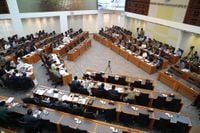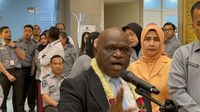On March 18, 2025, the Indonesian government held a crucial working meeting attended by various key officials, including the Vice Minister of Defense, to discuss a significant amendment to Law No. 34 of 2004 concerning the National Armed Forces (TNI). This meeting was part of the ongoing deliberations with Commission I of the DPR RI (House of Representatives) about the contentious draft law (RUU) aimed at revising existing military laws, aimed at ensuring the nation’s defense is aligned with democratic principles.
The main agenda of the meeting focused on Level I discussions regarding the proposed amendments, which have generated considerable debate among stakeholders. Minister of Law Supratman Andi Agtas expressed appreciation for the constructive engagement from both the government and Commission I in shaping the law’s content, asserting that their work aligns with Pancasila, the 1945 Constitution, and other relevant regulations. “We thank the leadership and members of Commission I as well as all parties involved for their support and participation in finalizing the discussions on the draft law,” Agtas remarked.
However, the discussions surrounding the RUU TNI have not been without controversy. On March 17, 2025, amidst growing public outcry over perceived risks that the proposed amendments could re-establish the military’s dual function in government—a feature from the New Order era—government officials and DPR leaders moved to clarify misunderstandings about the draft's contents. Sufmi Dasco Ahmad, Vice Chairman of the DPR from the Gerindra Party, emphasized during a press conference that there are only three articles up for revision: Article 3 addresses the position of the TNI, Article 47 limits civil posts for active military personnel, and Article 53 shifts retirement ages for soldiers.
Dasco provided further detail, stating that the revised retirement structure would see privates and corporals retire at 55, and respective ranks of officers being staggered up to 62 years for three-star generals. He affirmed, “There are no other articles in the draft that suggest a return to the dual functions of the TNI.” Puan Maharani, Chair of the DPR, reiterated this point and rejected claims of legislative secrecy, stating the processes are transparent and democratic.
In response to criticisms of lack of public access to the draft RUU, ministers have underscored their intent to limit civil roles eligible for active military duty only to 15 vital ministries. “We aim to adapt the revisions to modern realities while strengthening institutional roles,” commented Minister of State Secretary Prasetyo Hadi.
Nevertheless, public apprehension continued, with many activists perceiving the proposed changes as a potential threat to Indonesia’s democratic norms. Following an activist demonstration that interrupted discussions at the Fairmont Hotel, Human Rights Minister Natalius Pigai addressed the situation on March 19, suggesting that a restorative justice approach would be more appropriate than criminal charges against the protesters. He argued that the voices of activists advocating for their rights are a fundamental aspect of human rights that deserve respect. “The police should seek mediation solutions instead of punitive measures,” he stated.
This sentiment was echoed broadly by civil society leaders and observers, who argue that the legislative process surrounding the RUU TNI has been opaque and did not adequately involve the public. Fajri Nursyamsi from the Center for Law and Policy Studies emphasized the importance of transparency and public input in legislative affairs, noting that the failure to publish the draft law effectively hampers citizen engagement.
The discussions have seen numerous voices, with even government representatives recognizing the value of criticism in a democracy. Senior officials like Hasan Nasbi, head of the Presidential Communication Office, urged that criticisms must not only be recognized but should also contribute to ensuring that laws serve public interests. “Misinterpretations and false narratives surrounding the draft law need to be addressed clearly to prevent misinformation,” he remarked.
Despite the clarifications, skepticism persists among various sectors of society. Protests against the amendments highlight a fear of a return to authoritarian rule, reminiscent of a time when military and civil governance were entwined. Activists have denounced the legislative process as insufficiently open, voicing concerns through social media and public forums that lack substantial engagement opportunities from lawmakers.
The full scope of the Draft Law is under scrutiny as these discussions continue, with civil society groups advocating transparency and accountability. As the government and legislative body navigate this tumultuous period, the balance between national defense, civil rights, and participatory democracy occupies center stage. Observers call for efforts to ensure that this legislative process remains steadfastly committed to the principles of democracy, human rights, and public involvement.
As the dialogue evolves, it is evident that the government’s approach to addressing public concern will influence not only the outcome of the RUU TNI discussions but the broader health of Indonesia’s democracy. The path forward must prioritize open communication, inclusivity, and respect for civil discourse to foster an environment where citizens feel empowered and heard in their national legislative process.





